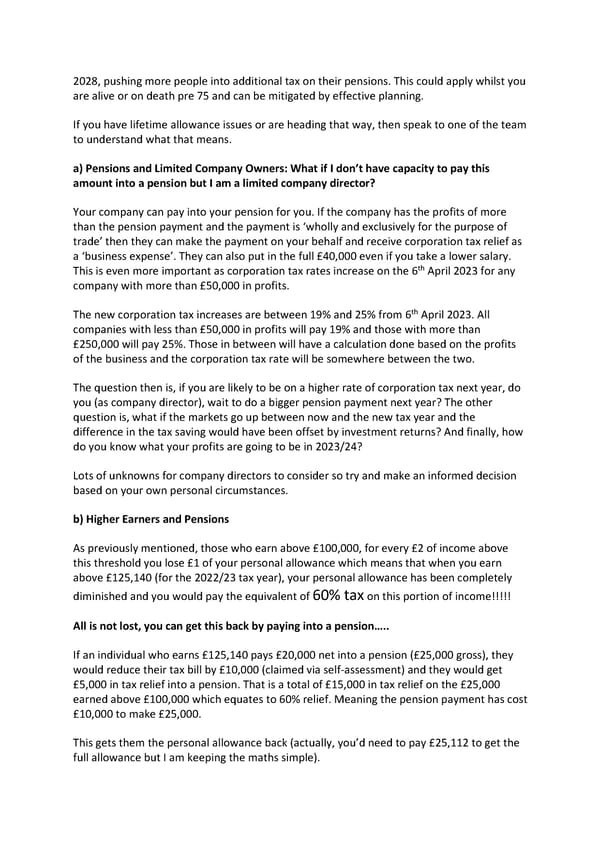2028, pushing more people into additional tax on their pensions. This could apply whilst you are alive or on death pre 75 and can be mitigated by effective planning. If you have lifetime allowance issues or are heading that way, then speak to one of the team to understand what that means. a) Pensions and Limited Company Owners: What if I don’t have capacity to pay this amount into a pension but I am a limited company director? Your company can pay into your pension for you. If the company has the profits of more than the pension payment and the payment is ‘wholly and exclusively for the purpose of trade’ then they can make the payment on your behalf and receive corporation tax relief as a ‘business expense’. They can also put in the full £40,000 even if you take a lower salary. th This is even more important as corporation tax rates increase on the 6 April 2023 for any company with more than £50,000 in profits. The new corporation tax increases are between 19% and 25% from 6th April 2023. All companies with less than £50,000 in profits will pay 19% and those with more than £250,000 will pay 25%. Those in between will have a calculation done based on the profits of the business and the corporation tax rate will be somewhere between the two. The question then is, if you are likely to be on a higher rate of corporation tax next year, do you (as company director), wait to do a bigger pension payment next year? The other question is, what if the markets go up between now and the new tax year and the difference in the tax saving would have been offset by investment returns? And finally, how do you know what your profits are going to be in 2023/24? Lots of unknowns for company directors to consider so try and make an informed decision based on your own personal circumstances. b) Higher Earners and Pensions As previously mentioned, those who earn above £100,000, for every £2 of income above this threshold you lose £1 of your personal allowance which means that when you earn above £125,140 (for the 2022/23 tax year), your personal allowance has been completely diminished and you would pay the equivalent of 60% tax on this portion of income!!!!! All is not lost, you can get this back by paying into a pension….. If an individual who earns £125,140 pays £20,000 net into a pension (£25,000 gross), they would reduce their tax bill by £10,000 (claimed via self-assessment) and they would get £5,000 in tax relief into a pension. That is a total of £15,000 in tax relief on the £25,000 earned above £100,000 which equates to 60% relief. Meaning the pension payment has cost £10,000 to make £25,000. This gets them the personal allowance back (actually, you’d need to pay £25,112 to get the full allowance but I am keeping the maths simple).
 Use it or Lose it - Tax Year End Planning 2023 Page 5 Page 7
Use it or Lose it - Tax Year End Planning 2023 Page 5 Page 7